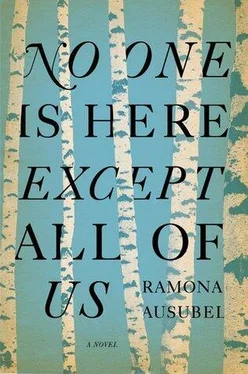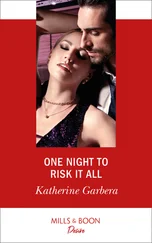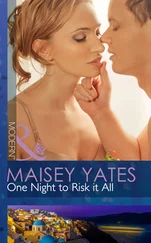They passed hamlets and hovels, Gypsy encampments and many roads that would have taken them back to the city. The rolling hills were bright green and dotted with yellow wildflowers and green pines, brooks and meadows. Even in pain and heartbreak, the grandparents commented on the beauty. For the last six days, descending the far side of the Carpathian Mountains, they saw no one. They passed through the scar of an old forest fire. In front of the grandparents twisted the muddy Dniester River, and in the oxbow below they saw the first village in nearly a week. It would have been an island if not for the road just wide enough for a cart at the opposite end.
The grandparents crossed an old bridge, two by two. The instant the last of them had crossed — goat herder and two goats — the bridge sagged below the surface and snapped in the middle. They were here to stay. There was a small wooden sign, and in white paint the name of the village: Zalischik. And on this almost-island, there were empty, falling-down stone houses. It was a leftover place, a forgotten place, and the grandparents looked at it and thought, Forgotten, yes, let us be forgotten. Let us be alone. They saw fallow fields and plenty of water for irrigating, an old granary and a deep well. The emptiers had already completed their mission here — the Jews and Gypsies had been expelled, taken care of. The map marked with an X, done. The circle of land was theirs to settle, a new world. They put their heads down, turned the earth, and began to plant seeds there.
For twenty years, they lived like forgotten people. They were a long way from any other villages, and farther still from any cities. The only way they knew they were alive was by repeating the stories again and again: the first man and the first woman, the great flood, the plague of frogs, the plague of blood, the plague of darkness. All the stories were stories of wandering, of being lost, of starting again. Meanwhile, the grandparents repaired the fallen-down walls, stopped up holes in the roofs, replaced missing street cobbles and stuffed all the mattresses with dried hay and horsehair.
My mother and father were born. My uncle and aunt. The banker, butcher, widow, greengrocer, future wives and husbands. They grew up, learned to tie their shoes, mend a curtain, harvest potatoes, tally the month’s ledger. They were taught all the languages everyone knew — the whole world on their tongues. They got married and had children of their own. Their parents began to grow weak and forgetful. On a sunny spring afternoon, my mother’s parents decided to go for a swim in the river, and their soft old bodies were not strong enough for the current, and they were carried away. A funeral was held in the cabbage field, and prayers were repeated. The healer told a story: Once, in the depths of despair, the prophet Ezekiel was carried to a field of old, dry bones, and Ezekiel spoke the name of the Lord, and the bones rose up, and skin covered them, and they were alive again. Always, another beginning.
Every few weeks, a man would come to deliver a piece of mail sent from a brother, sister or cousin in a faraway place. The letters contained news of births and deaths, pogroms and survivals, escapes and resettlings. Each spring and each fall, a few men would pack the cart with provisions to trade — lambs, turnips, cabbages, wool sweaters and socks knit by mothers and grandmothers, saddles hammered together — and set out into the world. Two weeks later, the cart would return with different provisions — sturdy canvas sacks, cotton pants for the men and cotton dresses for the women, wooden toys for the children, glass bottles for keeping milk, wooden buckets for storing butter, the sprout of an apple tree, ready to be planted, and a newspaper.
From this, the grandparents knew that a war began, raged, quieted. There were photographs of jagged shards of bombed-out buildings in Germany and tired Austro-Hungarian soldiers in Sarajevo. The grandparents recognized the places, having been to many of them. All the while, on their near-island, the days did not change. They kept repeating to themselves one word: forgotten . We remember the story, they thought, but let the story not remember us. Let us hide here until we are safe. And we had been, until now.
The healer cracked his knuckles and let his head hang heavy toward his chest. “No one in this room remembers learning to set fire to houses?” Regina asked.
We all shook our heads.
The old man who used to cut our hair wondered if perhaps we should start at the beginning and try to figure out where things went wrong: the same careful logic of hunting down a lost key. “This morning,” a teenage boy tried, “I woke up and nothing was different. I ate breakfast and watched a crow hop across the grass.”
“Yesterday morning,” the weaver’s mother said, “I arranged all the cups in the house by size and nested them perfectly in the cupboard.”
“Three weeks ago today I turned forty-one and I gave myself a pair of gold earrings to celebrate,” said the widow who lived at the edge of the village.
“I remember,” said the jeweler. “They looked pretty on you.”
“Last night, like every night, I dreamed I had a baby,” Aunt Kayla said.
“Last night, like every night, I dreamed you forgave me,” Hersh said under his breath.
The stranger swayed gently back and forth, a branch in the wind. I kept looking at her, waiting for her to say or do something. For a long time, all she did was listen.
We could remember many things about this year, and many about the year before, but no one could figure out the long ago.
“When we first arrived on the earth, did we like to swim right away?” I wondered. “Or did we have to learn to like to swim?”
We wished someone had made a drawing of that first human swimming. We wished someone had made a drawing of the scared ones, huddled on the shore. We must have been awkward and funny to watch, lumbering out in the dark, trying to find our way back to the holes where we slept. And it was only a guess that we slept in holes — it was possible we used to be better at climbing trees and maybe we had beautiful nests in all the crooks made out of tangles of our own hair.
“No,” the banker insisted, “God created man in His image and the garden was perfect and we were naked but we weren’t ashamed, and then there was the tree of knowledge and the snake, and the apple.”
“That’s just part of the story,” the widow said, licking her lips.
“We might have had wings first,” I said.
“We might have eaten nectar,” the banker’s wife said, smiling.
“We might have been able to talk to deer or eagles. We might have been much better at loving,” Uncle Hersh said.
“But what if we’ve always been the way we are? What if we have always been scared and mean and beautiful exactly like this?” I asked. “Good and evil, banishment.” The stranger’s cloudy eyes rested on my face. Their sorrow was so deep and wet and they chilled me.
We covered our faces and we cried.
“What else is going to float down that river?” my mother asked. Elsewhere, the rest of the world, unfolded like a giant map in front of us. All the other villages along the river, all the mountains, all the seas, all the cities. What had been blown up? What had been saved?
“I have a brother in America,” the jeweler said again. “Maybe we should go there. Run away.”
“The English and Americans are turning ships away. We’re too late,” the healer told him. On our map, the light of those faraway countries was snuffed out, leaving two great big, dark holes.
“We could go to Warsaw,” the butcher said. The healer drew an X over each eye with his fingertip. Poland turned dark.
“France has sometimes been friendly. Or Turkey?”
Читать дальше












